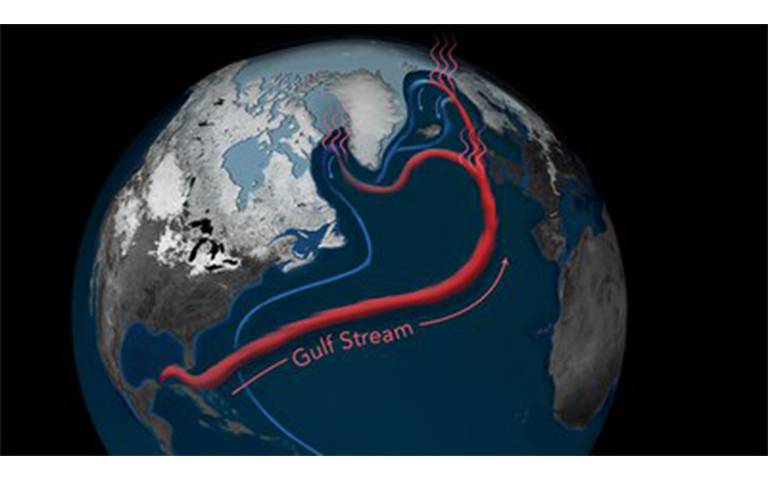Earth’s Gulf Stream System at its weakest in over a millennium
27 February 2021
The Atlantic Ocean undergoing unprecedented changes

The Guardian of 26th February devoted its page 1 headline to a new study involving UCL Geography researchers which shows consistent evidence of a decline in ocean currents, with the Gulf Stream System (also known as AMOC, the Atlantic Meridional Overturning Circulation) at its weakest in over 1,000 years.
Published in Nature Geoscience, the study concluded that the Gulf Stream’s slowdown in the 20th century was unprecedented and is likely to have been linked to human-induced climate change.
AMOC is a major mechanism for heat redistribution and is crucial to the world’s climate. An abrupt slowdown could thus trigger disruptions around the globe, including a rise in regional sea levels and changes in the position of major rainfall and arid climate zones.
The research team, made up of scientists from Ireland, Britain and Germany, was able to reconstruct the flow history of the AMOC over the last 1600 years. Data were compiled from a range of different and largely independent proxy indicators, including tree rings, ice cores, ocean sediments and corals, as well as from historical data such as ship logs. The findings build upon, and are consistent with, previous research led by co-author Dr David Thornalley (UCL Geography).
David warns:
“Whilst climate modelling has long predicted a slowdown of the AMOC as a result of human-induced warming, this study shows the increasing evidence in support of the modern Atlantic ocean undergoing unprecedented changes in comparison to the last millennium.
"Alongside other human pressures on the marine environment, the changes we are observing in ocean circulation are impacting marine ecosystems in both the surface and deep ocean. We will need to take account of these ongoing changes in our efforts to conserve and manage marine resources.
"Overall, this new study highlights that major changes are occurring but it also draws attention to how in future work we must aim to resolve which components and pathways of the AMOC have changed, how, and for what reason – there is a lot we still need to learn.”
See
- L. Caesar, G. D. McCarthy, D. J. R. Thornalley, N. Cahill, S. Rahmstorf (2020): Current Atlantic Meridional Overturning Circulation weakest in last millennium. Nature Geoscience, 25 February 2021, [DOI: 10.1038/s41561-021-00699-z]
- David J. R. Thornalley, Delia W. Oppo, Pablo Ortega, Jon I. Robson, Chris M. Brierley, Renee Davis, Ian R. Hall, Paola Moffa-Sanchez, Neil L. Rose, Peter T. Spooner, Igor Yashayaev & Lloyd D. Keigwin: Anomalously weak Labrador Sea convection and Atlantic overturning during the past 150 years, Nature, 2018, pp. 227–230(2018)
 Close
Close

